Provost ups the ante to attract outstanding diverse faculty
By Susan Kelley

It’s hiring season. Universities across the country are aggressively recruiting the most outstanding faculty for the next academic year.
“For the best people, the hiring landscape is very, very competitive,” said Vice Provost Judith Appleton. “Really strong candidates will have multiple offers. You don’t just post an ad for a position and wait to see what happens. You go after people.”
Cornell has faced two major challenges in this area, said Provost Michael Kotlikoff.
“First, we must be more effective at recruiting faculty who reflect the diversity of our society and our students, which means incentivizing academic departments to work as hard as possible to diversify the applicant pool and land the top candidates,” he said.
Second, dual-career applicants are increasingly the norm, and faculty positions for a candidate’s spouse or partner can be limited in Ithaca, Kotlikoff said. “Here, Cornell must provide an efficient process to develop opportunities for both applicants,” he said.
To overcome these challenges, Kotlikoff has committed funding for two policies aimed at bringing superior diverse talent to the faculty. The policies offer significant support to departments that have identified pre-eminent candidates who also diversify the faculty.
“A diverse community is the foundation for the meaningful exploration and exchange of ideas. At Cornell, we don’t simply want new faculty to fit in with what we are already doing,” Kotlikoff said. “We want them to expand our horizons, blaze new trails, create new knowledge and share all of what they have to offer with all of us.
“The formula is simple: Hire the best people, attract the most promising students and get out of their way,” he said.
Appleton added: “If we’re diverse, we’re better. That’s the only way to think about it. These policies tell the departments, ‘Find the best person for the job. If they diversify the faculty, you’ll get support from the Office of the Provost.’”
The policies show the administration takes seriously the need for more role models for students, said Yael Levitte, associate vice provost for faculty development and diversity. She noted that nearly 45 percent of entering freshmen identify as students of color.
“Students want to see a trajectory,” she said. “They want to see that they have a future at an institution like Cornell. They can see that when they see role models.”

With these new policies, the provost is putting significant support toward the recruiting – and retention – effort.
One policy will pay 25 percent of the salary for five years for a new faculty member who contributes to the department’s diversity by gender, race or ethnicity.
The effort already is paying dividends: The first faculty hire facilitated by this policy will join the Department of Microbiology and Immunology next year. “The provost’s support really allowed us to be a bit more aggressive in the recruiting,” said Avery August, professor and department chair.
Another policy expands the provost’s current support for dual-career couples and has the potential to increase the hiring of female faculty.
Female faculty candidates are often part of a dual-career couple. They are more likely than male candidates to be married to other academics and, therefore, are more likely than their male colleagues to have a spouse or partner also looking for a faculty position.
“The male faculty member with the wife who stays home is not the paradigm anymore,” Appleton said.
Under the new policy, the provost will shoulder most of the partner’s salary for five years.
The incentive facilitates hires between colleges: When one college hires a candidate, and another college hires that candidate’s partner, the provost will pay 75 percent of the partner’s salary for five years. The candidate’s college will pay the other 25 percent. If one college hires both the candidate and her partner, it will pay both salaries.
Previously, the partner’s salary was paid equally by the provost, the candidate’s college and the partner’s college for three years.
This is a substantial change, Appleton said. “Now the provost is really carrying the bulk of the cost for the partner’s salary.”
The provost will also pay up to 25 percent of the partner’s startup costs, such as lab equipment and research materials; the hiring college will pay the remainder.
The partner’s college must guarantee the partner’s job after the five years is up (if the partner performs well). Previously, the partner was often out of a job after three years, and the negotiating process started all over again. “In many instances, this was disruptive to both the college and the dual-career faculty couple,” Appleton said.
And a new protocol expedites dual-career hires. Whereas a partner’s hire used to take months – and Cornell lost choice candidates – now deans are required to move on proposals within a few weeks.
“Although it remains the primary responsibility of the colleges and schools to create a diverse and vibrant academic community, the university can play a more effective role in facilitating this effort,” Kotlikoff said.
Media Contact
Get Cornell news delivered right to your inbox.
Subscribe